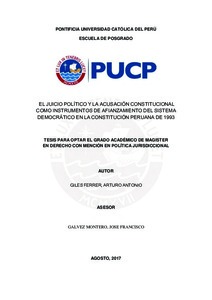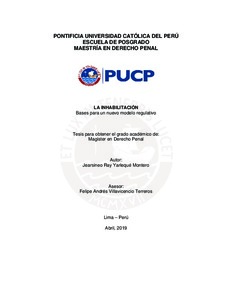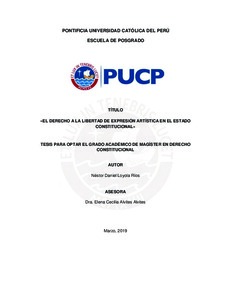| dc.contributor.advisor | Montoya Vivanco, Yvan Fidel | |
| dc.contributor.author | Martinez Tarazona, Flavia Teresa | |
| dc.date.accessioned | 2023-10-05T16:20:15Z | |
| dc.date.available | 2023-10-05T16:20:15Z | |
| dc.date.created | 2023 | |
| dc.date.issued | 2023-10-05 | |
| dc.identifier.uri | http://hdl.handle.net/20.500.12404/26088 | |
| dc.description.abstract | La presente tesis tiene como objetivo principal plantear cuatro casos-tipo en los que,
usualmente, las víctimas delinquen en el circuito de la trata de personas. Y, demostrar
que, en la mayoría de estas situaciones, las víctimas deben ser exoneradas de
responsabilidad penal. Para ello, propondremos la aplicación de eximentes de
responsabilidad penal, tomando en consideración los enfoques transversales (género,
derechos humanos, interseccional, y victimocéntrico), los instrumentos internacionales
de derechos humanos, y los marcos jurídicos comparados de derecho penal. Aunado a
lo anterior, hay algunos casos en los que – para evitar problematizar la situación y la
revictimización de las agraviadas – debe aplicarse una excusa absolutoria, cláusula que
también hemos diseñado para la presente investigación. Finalmente, habrán casos de
no aplicación como i) los de no sujeción de la víctima, y desligamiento en tiempo y
espacio del contexto de trata, así como ii) las acciones ilícitas calificadas como crímenes
de lesa humanidad y de guerra bajo el Estatuto de Roma. | es_ES |
| dc.description.abstract | The present thesis aims to propose four typical scenarios in which, typically, victims
engage in human trafficking activities. It seeks to demonstrate that, in many of these
situations, victims should be exempted from criminal responsibility. To achieve this, we
will suggest the application of legal exemptions from criminal responsibility, considering
cross-cutting perspectives (gender, human rights, intersectionality, and victim-centered
approaches), international human rights instruments, and comparative legal frameworks
in criminal law. In addition to the above, there are some cases in which - to avoid
complicating the situation and re-victimizing the aggrieved parties - an absolute excuse
should be applied, a clause that we have also designed for this research. Finally, there
will be cases of non-application such as i) those involving the non-subordination of the
victim to the trafficker and detachment in time and space from the trafficking context, as
well as ii) illicit actions qualified as crimes against humanity and war crimes under the
Rome Statute. | es_ES |
| dc.language.iso | spa | es_ES |
| dc.publisher | Pontificia Universidad Católica del Perú | es_ES |
| dc.rights | info:eu-repo/semantics/openAccess | es_ES |
| dc.rights.uri | http://creativecommons.org/licenses/by-sa/2.5/pe/ | * |
| dc.subject | Trata de personas--Perú | es_ES |
| dc.subject | Derechos humanos--Perú | es_ES |
| dc.subject | Derecho penal--Perú | es_ES |
| dc.subject | Mujeres--Derechos--Perú | es_ES |
| dc.subject | Género | es_ES |
| dc.title | De víctimas a ¿criminales?: Un análisis desde el derecho penal y los derechos humanos sobre la no punibilidad de las víctimas en el circuito de la trata de personas | es_ES |
| dc.type | info:eu-repo/semantics/bachelorThesis | es_ES |
| thesis.degree.name | Abogado | es_ES |
| thesis.degree.level | Título Profesional | es_ES |
| thesis.degree.grantor | Pontificia Universidad Católica del Perú. Facultad de Derecho. | es_ES |
| thesis.degree.discipline | Derecho | es_ES |
| renati.advisor.dni | 16641697 | |
| renati.advisor.orcid | https://orcid.org/0000-0002-4600-3827 | es_ES |
| renati.author.dni | 73196619 | |
| renati.discipline | 215106 | es_ES |
| renati.juror | Caro John, Jose Antonio | es_ES |
| renati.juror | Montoya Vivanco, Yvan Fidel | es_ES |
| renati.juror | Rodriguez Vasquez, Julio Alberto | es_ES |
| renati.level | https://purl.org/pe-repo/renati/level#tituloProfesional | es_ES |
| renati.type | https://purl.org/pe-repo/renati/type#tesis | es_ES |
| dc.publisher.country | PE | es_ES |
| dc.subject.ocde | https://purl.org/pe-repo/ocde/ford#5.05.02 | es_ES |










